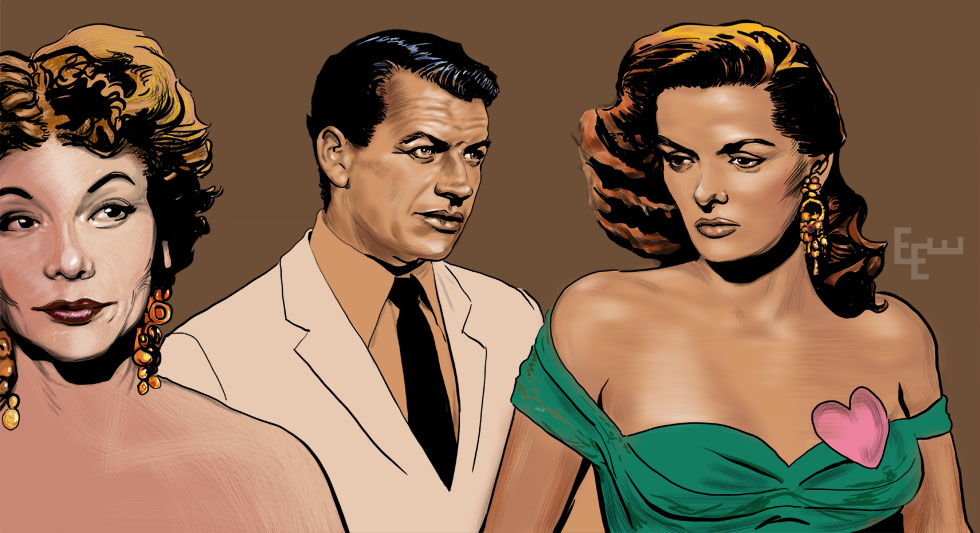Revolt of Mamie Stover - 1953
Jane Russell conquers Hawaii

Directed by Raoul Walsh. Released May 4, 1956
Jane Russell makes a fortune in Hawaii as World War II gets started, and it reminds us of Donna Reed from From Here to Eternity
If you've seen the 1953 From Here to Eternity, you've already (partially) seen The Revolt of Mamie Stover. In the 1953 film, Donna Reed plays a social club girl (a kind of temporary girlfriend for hire* while a military man is in a social club, buying drinks and dancing) who is in Hawaii and gets involved with the film's lead character, Private Prewitt (Montgomery Cliff). Though the main thrust of the story in Eternity is about Prewitt (and co-star Burt Lancaster's character of Sgt. Milton Warden), in the background is the travails of Lorena (Donna Reed) and her ambition to build up enough money to go back home to a small town in Oregon, take care of her mother, and to be "safe" (so she believes) and socially acceptable with the protection of accumulated wealth.
In Revolt, Jane Russell as Mamie Stover is also in Hawaii (though she doesn't start there, the story starts with her getting kicked out of San Francisco), and she also becomes employed at a social club as a hostess. Mamie also has the ambition to pile up enough money to go back home to her small town (Leesburg, Mississippi) and to take care of herself (and her father), an ambition she tells to journalist and novel-writer Jim Blair (Richard Egan).
Both Mamie and Lorena are convinced their particular life stories are peculiar, only to be corrected by their leading men:
From Here to Eternity 1953
Lorena: I came here on my own to get away from my hometown in Oregon. I had a boyfriend. I was a waitress and he was from the richest family in town. He just married a girl suitable for his position after three years of going around with me. It's a pretty story, isn't it? Maybe they could write a book about it.
Prewitt: They did. Thousands of 'em.
The Revolt of Mamie Stover 1956
Mamie: Do you ever buy any ideas, like, say, part of somebody's life story?
Jim Blair: Yours?
Mamie: Maybe.
Jim Blair: Your stories been done.
Though it seems harsh to say each woman's particular tragic tale isn't unique, it does set up the plot (or in the case of Lorena, a sub-plot) in which both girls are determined to hack out their version of the American Dream, but Lorena's is mostly a background struggle whereas Mamie is front and center and bursting with effort, with plenty of costume changes and her own theme song ("If You Wanna See Mamie Tonight" by Francis Webster and Sammy Fairn).
Though the similarities between the two films are strong, and both stories center on Hawaii and the complacent atmosphere of pre-World War II Honolulu, only to be interrupted with the Japanese attack on Pearl Harbor, The Revolt of Mamie Stover doesn't have any overhead baggage (like Eternity) of too many leading men (Richard Egan's story in Revolt is almost entirely dependant upon Mamie to move it forward).
When I first saw the film, my gut reaction was it was as if Lorena from Eternity had broken loose and commandeered a production for her own movie. On the other hand, there really are large differences between Mamie and Lorena. First of all, Lorena isn't even Lorena, she's really named Alma and was given a 'better' name to help sell her to the military clientele searching for the exotic. By the time From Here to Eternity winds down and Lorena/Alma is leaving Hawaii to finally go home, she concocts a romantic cover story about how her "fiancée" Prewitt died, and in her retelling of events he is no longer what he actually was, a "lifer" in the army, but is upgraded by Lorena into a pilot killed in the Pearl Harbor attack (instead of killed by a knife wound from an alley brawl and more to the point and ignominiously, via friendly-fire).
Donna Reed's Alma is tough, but an alternatively fragile person who is more humanly portrayed, and more prone to self-deception than the impervious Mamie who is going to overwhelm all obstacles (including ethical ones while Richard Egan is pining for her from the Pacific war zone) in her march toward her goals, and she competes and beats men at their own games, particularly buying and selling real estate as the Hawaiian market becomes chaotic due to the war.
If From Here to Eternity were a pulp tale (though a complex one), then Mamie Stover is more of a comic book, with everything presented broadly and the characters sharply and simply portrayed, and what nuance there is, is generally given to the lead actress (though Agnes Moorehead is provided with a good sub-story as the owner of the social club who finally ejects a vicious pimp-like enforcer that has been co-running her club for years).
Director Raoul Walsh gives us a full color, wide screen Hawaii in Mamie (Eternity was black and white in standard screen ratio), and though Walsh's scenes of the island seem somewhat mundane compared to how the island is presented in other, later films and TV shows as an exotic, palm-infested paradise, Walsh does have the advantage of Pearl Harbor looking more or less like it did in 1941, without the mass of development that has since crowded the area, thus lending it some historical authenticity backed up by the actual locations of the Pearl Harbor attack (though residential homes in the background look 1950s, not 1930s). But historical accuracy isn't the goal here, since everybody in this movie looks like they are living in the world of 1956, not 1941, from the haircuts to the clothing (especially Jane's stage costumes), and no effort is made to pretend it is otherwise except for automobiles and a few other screen artifacts.
Jane Russell always excelled with angry characters who must stand out in scenes of conflict, and to mitigate it effectively the actress was very good at issuing sarcastic lines, and she does all of that in Mamie. By just arching her eyebrows, Russell communicates her silent observation of the absurd humor of a scene to the audience, and that's a skill that not that many actors possess, and it seems like a throwback to the silent movie era (reminding me in a small way of Montgomery Clift, from his various roles, as he often used fluid hand motions, much like the silent film stars did, adding additional expression beyond just line reading or voice tone).
But, more like a typical movie of the era, Mamie tries to move most of the tale forward with dialogue (not unlike the wordy Eternity), so in other scenes in which she and Egan are trying to work out the fundamentals of a standard Hollywood love relationship, she and Egan don't have a lot to work with except talk. Sometimes the script by Sydney Boehm does perk up with good dialogue, and the story of an enterprising and uncompromising girl in business is unusual for a 1956 film, but the soap opera elements do constantly threaten to overwhelm the tale, and frankly the repetitive similarities to From Here to Eternity don't help (since in general, Eternity did it better, first).
The Music is by Hugo Friedhofer and it is good, often lush and always reinforcing whatever Director Walsh is trying to get across on the screen.
Unfortunately, Mamie suffers a case of third-act panic, and that is the only real downside to this movie, which churns along with a full head of steam with a multi-year saga playing out that seems to be directly headed for some kind of grand Hollywood ending and dénouement, but then completely changes track and shows us a (sort've) more realistic finis. But this ending is so compacted it seems like a last-minute solution, as if the producer walked up to the film crew and said "time's up" (or they said to the producer, "we're out of ideas") and despite the juxtaposing irony of Mamie willfully separating herself from her wealth (rather unbelievable and jarring) there is the sudden jolt of the movie simply, suddenly, ending, too.
I wonder if the creators fell into the trap that comes at the end of another "woman in business" movie, the Barbara Stanwyck Baby Face from 1933, which also ends with a woman giving up her fortune that she just spent 71 minutes sweating and slaving to pile up (with Mamie, it is 92 minutes of labor).
On the other hand, while Baby Face ends with the classic choice that the lead must choose between love or gold, Mamie in the end chooses neither. The problem is that it just isn't explained very well, with Jane Russell now back in San Francisco and getting scooted-out-of-town all over again, and a flabbergasted Richard Egan having given up his pursuit of Mamie with a calm, carefully worded exit scene, saying "I shouldn't expect you to understand." Does he mean Mamie, or the audience?
At least this time as she is escorted by the police from San Francisco, she seems to be actually going home, and as we've learned from the earlier scenes, if she can outfox the business people of Hawaii and build a fortune, she should be able to do it all over again in Mississippi.
* Many movie reviews seem to take it for granted that both the Donna Reed character in From Here to Eternity and the Jane Russell character in The Revolt of Mamie Stover are prostitutes. The source material certainly backs that claim, but the films by themselves do not, which cast the job situations as something other than prostitution. "That's just to get the film past censorship," is probably the most appropriate response, though it seems to me this is instead a case of what underlies all Hollywood movies: the stories take place in an alternative Hollywoodian reality where the obvious and the "real" doesn't have that much cachet, and anything is possible, including Donna Reed and Jane Russell making a fortune in a man's social club in Hawaii off their sparkling on screen personalities. A general rule of thumb for movies is that what is in a film is what constitutes the film's story, not what is outside of the film.
Related
Jane Russell – Born June 21, 1921 – Died February 28, 2011
The Fuzzy Pink Nightgown – 1957Starring Jane Russell, Ralph Meeker and Keenan Wynn
What's Recent
- Island of Desire - 1951
- Road to Morocco
- The Devil and Miss Jones - 1941
- Sinners - 2025
- Something for the Boys - 1944
- The Mark of Zorro - 1940
- The Woman They Almost Lynched - 1953
- The Cat Girl - 1957
- El Vampiro - 1957
- Adventures of Hajji Baba – 1954
- Shanghai Express 1932
- Pandora's Box – 1929
- Diary of A Chambermaid - 1946
- The City Without Jews - 1924
- The Long Haul
- Midnight, 1939
- Hercules Against the Moon Men, 1964
- Send Me No Flowers - 1964
- Raymie - 1964.
- The Hangman 1959
- Kiss Me, Deadly - 1955
- Dracula's Daughter - 1936
- Crossing Delancey - 1988
- The Scavengers – 1959
- Mr. Hobbs Takes A Vacation - 1962
- Jackpot – 2024
- Surf Party - 1964
- Cyclotrode X – 1966
Original Page July 2020 | Updated December 1, 2021
